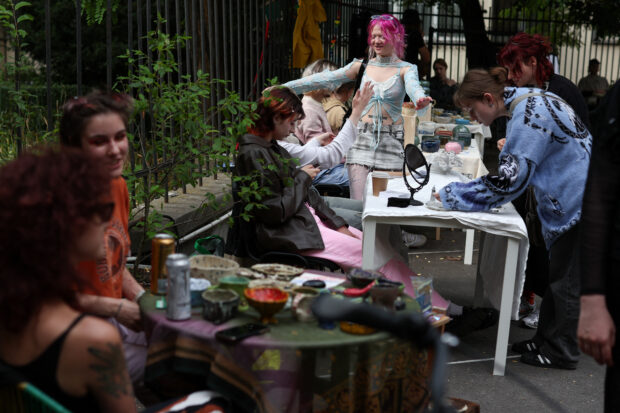
File photo: People attend a cultural event organized by Sunflower Solidary Community Center, at the TR Warszawa theater courtyard, in Warsaw, Poland July 2, 2023. REUTERS/Kacper Pempel
WARSAW — Yulia Krivich is part of a burgeoning community of artists from around the former Soviet Union that has helped turn the Polish capital into a major hub of creative talent, especially after Russia launched its full-scale invasion of her native Ukraine.
Krivich, who has lived in Poland for more than a decade, now organises exhibitions, workshops and other events at Warsaw’s Museum of Modern Art with the aim of confronting what she sees as the collective trauma of Russian colonialism.
“We came here (to the museum) on the third day of the invasion and stayed. We like to call it the occupation of the Museum of Modern Art and the director is happy with the occupation,” Krivich, 34, joked.
“We came here to make banners for a protest at the Russian embassy and stayed,” she said.
Even before Russian troops poured into Ukraine on Feb. 24, 2022, Poland had been hosting thousands of migrants from the east, including people who fled a Moscow-backed uprising in eastern Ukraine and turmoil in Belarus and Central Asian states.
Poland, which borders Belarus and Ukraine, and was also once part of the Russian empire under the tsars and then of the Moscow-led Soviet bloc for decades – is a perfect place, in Krivich’s view, for artists to explore the theme of “decolonising Russia”.
“Many of my friends from Kyrgyzstan, Ukraine and Belarus feel at home here, also mentally, culturally and ideologically… We have a common past,” Krivich told Reuters.
Theater
Warsaw is also proving fertile territory for drama.
In the courtyard of Warsaw’s New Theatre, Marina Dashuk awaits the performance of her mentee Palina Dabravolskaya, a 27-year old Belarusian director and actress completing a residency for Belarusian artists launched in 2021.
Dashuk, 44, has worked as a theatre producer in Poland since 2013, but it was only after the crushing of anti-government protests in Belarus in 2020 that she focused on working with fellow Belarusian artists.
“When the revolution in Belarus began, artists started fleeing… Then (Russian-born playwright and director) Ivan Vyrypaev proposed making a theatre play with Belarusian actors and that is how our huge cooperation with the New Theatre began,” Dashuk said.
The play’s title “1.8m” refers to the space available to individuals in overcrowded Belarusian prisons. Directed by Vyrypaev, the performance is based on political prisoners’ court speeches and letters.
The New Theatre not only gave the refugee actors a chance to perform but also helped them with accommodation and visas. Since then, other institutions have followed suit.
“Poland is the only country where Belarusians can easily legalise their stay… All independent art initiatives that used to be in Minsk are now in Warsaw,” said Dashuk.
Vyrypaev, 49, whose plays have been staged in more than 250 theaters worldwide, has also launched a new project in Warsaw – Teal House, staffed by Ukrainian and Belarusian refugees, offers activities ranging from drama and music performances to yoga and trauma healing.
In May, a Moscow District Court arrested Vyrypaev in absentia for spreading “fake news” about the Russian army.
“These are incredibly tragic circumstances,” Vyrypaev said, referring to the war. “But Poland has a chance to become a real leader… of eastern Europe… It is a chance that should not be missed.”